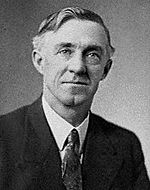David Coleman | |
|---|---|
 | |
| Member of the New Zealand Parliament for Gisborne | |
| In office 2 December 1931 – 30 November 1949 | |
| Preceded by | Douglas Lysnar |
| Succeeded by | Reginald Keeling |
| Personal details | |
| Born | 1881 London, England |
| Died | (aged 69) Gisborne, New Zealand |
| Political party | Labour (1919–51) Social Democratic (1914–19) |
| Spouse | Julia Jane Bigwood |
| Children | 2 |
David William Coleman (1881 – 13 March 1951) was a New Zealand politician of the Labour Party.
Biography
[edit]Early life
[edit]He was born in London in 1881, and lived as a child and young man in Queensland. He worked as a carpenter and later as a furniture salesman.[1] He joined the local debating society and maintained an interest in the vocation for the rest of his life.[2]
In 1902, aged 21, he emigrated to New Zealand and first lived in Wellington, before moving to Gisborne where he established his own retail business. In 1904 he married Julia Jane Bigwood and had two children.[2]
Political career
[edit]| Years | Term | Electorate | Party | ||
|---|---|---|---|---|---|
| 1931–1935 | 24th | Gisborne | Labour | ||
| 1935–1938 | 25th | Gisborne | Labour | ||
| 1938–1943 | 26th | Gisborne | Labour | ||
| 1943–1946 | 27th | Gisborne | Labour | ||
| 1946–1949 | 28th | Gisborne | Labour | ||
Coleman became secretary of the Poverty Bay Labourers' Union and then became secretary of the Gisborne branch of the Social Democratic Party (SDP).[1] Coleman supported the merger of the SDP into the New Zealand Labour Party and was on the Labour Party's first national executive, serving on it and the Gisborne LRC for twenty-one years.
He was Mayor of Gisborne for two separate spells, from 1927–33 and 1935–41.[1] He was likewise a member of the Cook Hospital Board, Poverty Bay Power Board and Gisborne Fire Board.[2]
He represented the Gisborne electorate from 1931, having stood unsuccessfully in the 1925 election and the 1928 election. He retired in 1949 owing to ill health.[3]
From 1942 until 1947 he was the Labour Party's junior whip.[4] Coleman was then Parliamentary Under-Secretary to the Minister of Works from 1947 to 1949.[5]
Later life and death
[edit]In 1935, he was awarded the King George V Silver Jubilee Medal.[6]
Coleman died on 13 March 1951, aged 69, survived by his second wife, son and daughter. He was buried at Taruheru Cemetery, Gisborne.[1][7] He had been predeceased by his wife, Julia Jane Coleman, in 1941.[7]
Notes
[edit]- ^ a b c d Gustafson 1986, p. 278.
- ^ a b c "Obituary - Mr. D. W. Coleman". The Evening Post. 14 March 1951. p. 5.
- ^ Wilson 1985, pp. 189.
- ^ Wilson 1985, pp. 280–1.
- ^ Wilson 1985, pp. 84.
- ^ "Official jubilee medals". Evening Post. Vol. CXIX, no. 105. 6 May 1935. p. 4. Retrieved 2 July 2013.
- ^ a b "Details for David William Coleman". Gisborne District Council. Retrieved 5 June 2019.
References
[edit]- Wilson, James Oakley (1985) [First ed. published 1913]. New Zealand Parliamentary Record, 1840–1984 (4th ed.). Wellington: V.R. Ward, Govt. Printer. OCLC 154283103.
- Gustafson, Barry (1986). From the Cradle to the Grave: a biography of Michael Joseph Savage. Auckland: Reed Methuen. ISBN 0-474-00138-5.